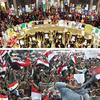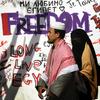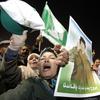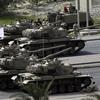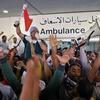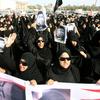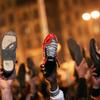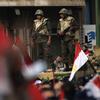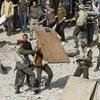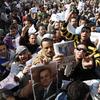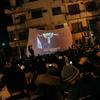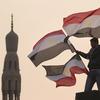Nicholas Kristof appears in the following:
How Middle East Revolutionaries Would View a Shutdown
Friday, April 08, 2011
Nicholas Kristof, columnist for The New York Times and Mina al Oraibi, Washington D.C. Bureau Chief for the Arab-language newspaper Asharq al Awsat talk about the view of the U.S. government shutdown from the Arab world. As revolutions have spread throughout the Middle East this year, American politicians have had a lot to say about the importance of democracy in the region. But today, as the U.S. government teeters on the brink of a shutdown, do these words ring hollow to Arab revolutionaries? What would a shutdown look like to the countries fighting for democracy in the Middle East?
Nicholas Kristof on Post-Revolutionary Egypt
Wednesday, March 30, 2011
The Egyptian military high council has announced that parliamentary elections are being put off until September. Opposition leaders are asking for more time to organize themselves into political parties. Presidential elections, originally scheduled for August, will also be held then. While younger Egyptians are hopeful about elections, they have grown wary of the military high council, which has ceased to be the force for change that they had hoped for.
Updates from Bahrain and Libya
Monday, February 21, 2011
Protests continued to rage across the Middle East throughout the weekend. While the Bahraini government withdrew its military from the capital and allowed peaceful demonstrations, Libyan security forces continued to fire on protestors in Benghazi and Tripoli. Human Rights Watch estimates that the Libyan government has killed at least 223 protesters since political unrest began six days ago. But in a nationally-televised address, the son of Libyan ruler Col. Moammar Gadhafi, Seif al-Islam al-Gadhafi, claimed that the death toll was greatly exaggerated and that Libya was on the brink of civil war. Will Gadhafi hold onto power? What's next for Bahrain? And how will the Obama Administration respond?
Bahrain Turns Violent Over Protests
Friday, February 18, 2011
As a symbol of change in the Arab world, angry protests in Bahrain stand in stark contrast to the mostly peaceful demonstrations in Egypt that led to the ousting of President Hosni Mubarak. Reporters describe sleeping demonstrators attacked without warning while camped out in Pearl Square. The police used birdshot, rubber coated steel bullets and tear gas to tamp down the civil unrest, killing three and injuring many more. Now the military has taken over the city and called for a ban on organized gatherings, while moving tanks into Pearl Square.
Update from Bahrain with Nicholas Kristof
Thursday, February 17, 2011
At least five people have been killed in Bahrain where police fired on protesters overnight. Just before dawn Thursday, riot police with tear gas, percussion grenades and clubs drove protesters from a main square where they had demanded sweeping political change in this tiny kingdom. Some were sleeping when they were killed by close range shotgun blasts. Bahrain's military made a statement on television, saying that it has taken control of most of the capital and has banned all gatherings. Columnist for The New York Times, Nicholas Kristof is in Bahrain.
Bahrian: Protesters Follow Egypt's Lead
Wednesday, February 16, 2011
The New York Times' Nicholas Kristof is in Bahrain, where protesters have taken over the central square in Manama. Tuesday, the police killed two protesters, but today, the protests have been peaceful. Bahrain's citizens are asking for a real consitutional monarchy. Kristof explains that the rise of the middle class in Bahrain is one of the reasons there are demands for a more democratic rule.
Nicholas Kristof on the Future of Egypt
Friday, February 11, 2011
Today will be yet another historic day for the country of Egypt following yesterday’s televised statements by President Hosni Mubarak who explained that he has no intention of stepping down as president. Columnist for The New York Times, Nicholas Kristof describes just how out of touch a dictator can be, saying he essentially threw "gasoline on a fire."
Egypt's Future? Watch the Military
Friday, February 11, 2011
Nicholas Kristof, columnist for The New York Times responds to ongoing events in Egypt. He says that we should be watching the military as events continue to unfold in Egypt. The U.S. is likely pressuring Egypt's Army to stay peaceful, but dictatorships can be equally influential and some of Egypt's generals may see their future aligned with Mubarak, notes Kristof.
Clashes Heat Up Around Tahrir Square
Thursday, February 03, 2011
Columnist for The New York Times, Nicholas Kristof reports live from Cairo's Tahrir Square, where pro and anti-government clashes are turning violent again. Egyptian soldiers had been separating the two sides, but are now letting the protesters advance. Gunshots have been heard.
Update from Tahrir Square
Thursday, February 03, 2011
The Egyptian army has stepped in to protect pro-Democracy demonstrators in Tahrir Square after a day of violence. The New York Times columnist, Nicholas Kristof has been reporting from the square, where he was wary of the organized and aggressive pro-Mubarak demonstrators as soon as they showed up. He brings us the latest from the scene.
Violence Erupts in Egyptian Protests
Thursday, February 03, 2011
After days of relatively peaceful demonstrations, a new voice has emerged in the Egypt as pro-Mubarak supporters took to the streets of Cairo yesterday. With Mubarak's supporters came the introduction of rocks, clubs, stones, knives and Molotov cocktails. The attacks did not come from the military, the disputes occurred between the two rivaling sides.
Clashes Break Out in Tahrir Square
Wednesday, February 02, 2011
Clashes have broken out in Cairo's Tahrir Square between Pro-democracy and Pro-Mubarak demonstrators. The pro-Mubarak supporters that have taken to the streets are "incredibly aggressive" says New York Times columnist, Nicholas Kristof. There are questions as to whether they were organized and sent into the streets to incite violence.
Egypt: A Need for Reconciliation?
Wednesday, February 02, 2011
While rejecting calls for his immediate ouster, Egyptian President Hosni Mubarak agreed not to seek reelection in the planned September elections. A new government is all but guaranteed in the region, but will the country's transition to Democracy be peaceful? Columnist for the The New York Times, Nicholas Kristof, reports from Tahrir Square, where he saw aggressive pro-Mubarak demonstrators and says he is concerned that there may be clashes between them and pro-Democracy demonstrators.
Wave of Change: Nicholas Kristof from the Cairo Protests, How the Egyptian Military Differs From the Police
Tuesday, February 01, 2011


Welcome to the premier edition of a brand new special podcast from The Takeaway, covering the mass protests in Egypt and its consequences for the wider Arab World.
This episode features a recap of the day's events with New York Times columnist Nicholas Kristof; a "face in the crowd" interview with Egyptian actor and protester Amr Waked; a deep look at the difference between the police and the Army in Egypt and a Takeaway from this morning's show.
Massive Protests Continue in Egypt
Tuesday, February 01, 2011
As the political tumult in Egypt enters an eighth day, the government of authoritarian President Hosni Mubarak suffered a major blow last night when the Army announced that it would not use violence to suppress the opposition movement that has formed against him. Meanwhile, protesters are expected to engage in a massive march and general strike calling for Mubarak's ouster today.
Tensions Build as Southern Sudan Prepares for Independence Vote
Friday, December 17, 2010
On January 9th, Southern Sudan is scheduled to vote on whether to break away from the North and form a separate nation. So far over three million people have signed up to vote, with about 96 percent in favor of secession. This referendum is part of a 2005 peace agreement between the North and South, but tensions in the North about oil reserves are high, and the South continues to struggle with basic humanitarian needs. New York Times columnist Nicholas Kristof explains what's at stake — and whether a vote with such high stakes can go off without a hitch.
What Does Haiti Still Need, Ten Months Post-Earthquake?
Friday, November 26, 2010
Ten months after the devastating January earthquake, Haiti still needs support for schools, factories and businesses. In the past few weeks, Haiti has needed better plumbing and medical support for a cholera epidemic.
Risk and Reward: The Real Cost of Doing Business in China
Wednesday, March 24, 2010
This week Google shut down its search operations in mainland China. Now Chinese Googler’s are getting sent to a Hong Kong domain, but it's unclear how much longer that will last. So why did the search giant pull out of a country that seems to represent so much economic opportunity for other multinational corporations? New York Times columnist Nicholas Kristof and Brookings Institution analyst Kenneth Lieberthal try to answer.
